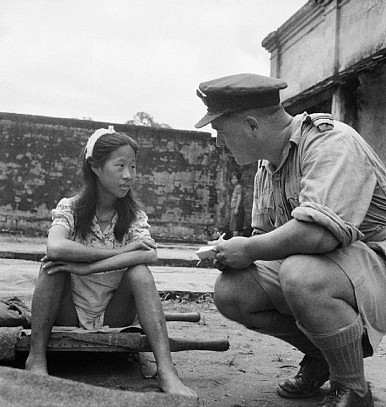
Image Credit: UK Imperial War Museums
On December 28, Japan and South Korea announced a landmark deal to resolve the issue of “comfort women,” the euphemism used for women forced to sexually service Imperial Japanese Army troops during World War II. The deal announced last Monday sees Shinzo Abe apologize, as Japan’s prime minister, for the women’s suffering. Japan’s government also pledged to provide 1 billion yen ($8.3 million) to a fund for the women, to be established by the South Korean government.
The “comfort women” issue, and the degree to which Japan’s government will (or won’t) accept responsibility for the forced recruitment of the women, has been a major flashpoint in Japan-South Korea relations. However, South Korea isn’t the only country from which “comfort women” were drawn, and the deal between South Korea and Japan has sparked mixed reactions from other states — most notably China and Taiwan.
China (along with South Korea) has been the most vocal in accusing Japan’ of “whitewashing” history. Unsurprisingly, then, Beijing adopted a cautious stance on the comfort women deal, insisting that it would have to “wait and see” whether Japan’s actions matched its words. When the deal was announced, Foreign Ministry spokesperson Lu Kang spent more time highlighting the historical issue than addressing the deal. “The forced recruitment of the ‘comfort women’ is a grave crime against humanity committed by the Japanese militarism during the Second World War against people of Asian and other victimized countries,” Lu said, urging Japan to “face up to and reflect upon its history of aggression and properly deal with the relevant issue with a sense of responsibility.”
The general consensus in Chinese state media is that the comfort women deal does not go far enough. Xinhua in particular has repeatedly called Japan’s sincerity into question in its articles on the agreement (see here, here, and here for examples). In particular, Xinhua argued that by making a deal specifically with South Korea, Japan was not acknowledging the full extent of the “comfort women” issue. “Apart from Korean women, victims also include the women of China, the Philippines and other Southeast Asian countries, who also deserve an apology and compensation,” one Xinhua editorial pointed out.
The last surviving member of a group of Chinese comfort woman seeking to sue the Japanese government passed away in November at the age of 89. Yet the issue continues to live on, with China’s first memorial to the comfort women opening in December in the city of Nanjing. Beijing also sought to have documents related to the comfort women issue inscribed in the UNESCO Memory of the World Register, though that attempt was unsuccessful.
When asked if China would hold its own talks with Japan on the comfort women issue, Lu simply repeated China’s call for Japan “to face squarely and reflect upon its history of aggression and deal with the relevant issue in a responsible manner.” Though Chinese state media has called for Japan to apologize to and compensate comfort women of all nationalities, there’s no indication the that government is seriously negotiating on the issue with Japan.
By contrast, Taiwan is preparing to enter negotiations with Japan, seeking a deal similar to the one announced with South Korea. On December 29, President Ma Ying-jeou reiterated his government’s stance on the comfort women issue, saying, “The Republic of China government has always said that Japan should apologize to Taiwanese comfort women and offer compensation to them.” The same day, Foreign Minister David Lin said Taiwan would “continue negotiating with Japan to restore the dignity of Taiwan women forced into sexual slavery by the Japanese army.” He said Japan had agreed to adopt a “flexible” stance and conduct negotiations, which will start in January in Tokyo.
On Tuesday, a cross-agency working group (which including a comfort women advocacy group, the Taipei Women’s Rescue Foundation) met to hammer out a strategy for negotiations with Japan. According to Taiwan’s Central News Agency, Taipei will ask Tokyo to “issue a formal apology to Taiwanese comfort women, offer compensation to the surviving women, and restore their reputation.” Taiwan’s top representative in Japan, Shen Ssu-tsun, met on Monday with the head of Japan’s Interchange Association, which handles relations with Taiwan, to discuss the issue.
Charles Chen, a spokesperson for Taiwan’s Presidential Office, confirmed on Tuesday that Taiwan wants the same deal that Japan offered to South Korea. However, Taiwan was unnerved by comments from Japan’s chief cabinet secretary that Tokyo does not, in fact, intend to start a new round of negotiations with other countries based on the South Korea deal. Yoshihide Suga told reporters that Japan has dealt with the issue “in a sincere manner considering each circumstance” in different countries. He indicated that the situations in other countries were “different” from the one in South Korea, suggesting that Japan will not extend to same offer to other governments.
According to the Taipei Women’s Rescue Foundation, there were around 2,000 Taiwanese women forced into sexual slavery during World War II. Of the 58 who came forward to demand an apology and compensation from Japan, four are still alive.
By Shannon Tiezzi from The Diplomat

Reblogged this on Roly Andrews Author and commented:
The passing of time should not let us forget the suffering of these women. A simply apology seems inadequate to me – but that is all they ask.